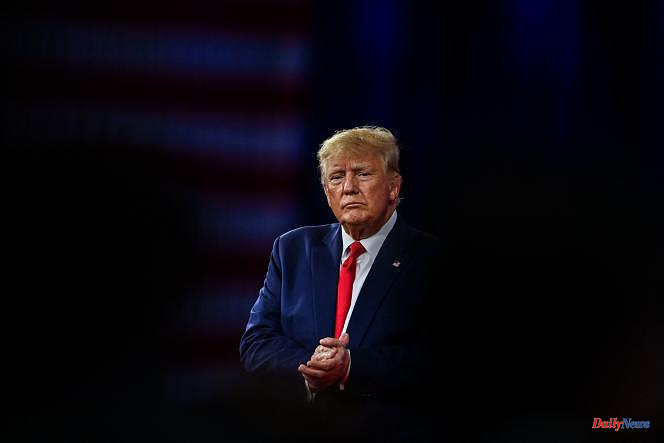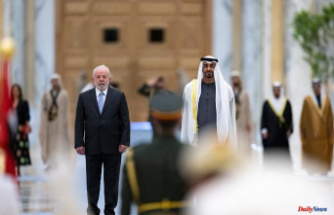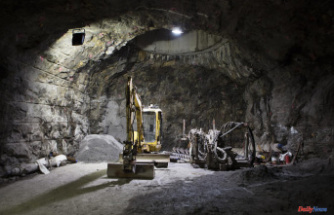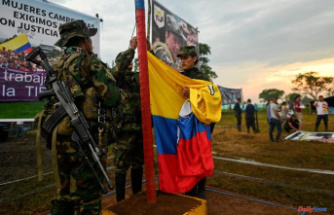Donald Trump entered US history through the back door on Thursday, March 30, by becoming the first former US president to be indicted by a grand jury. Tuesday, April 4, he must appear before the New York justice, where he must be photographed, undergo fingerprinting and then be formally charged.
This new step in the billionaire's legal troubles should not be the last, as the charges against him are serious and numerous.
Stormy Daniels payment disguised as campaign expenses
Trump indicted on March 30
Opened in August 2018 by then-Manhattan District Attorney Cyrus Vance Jr., and taken over since the summer of 2022 by his successor, Alvin Bragg, the investigation seeks to determine whether the former Republican president is was found guilty of a misrepresentation, a minor offence, and above all of breach of the laws on election financing, a criminal offense, by having included in his campaign expenses a payment of 130,000 dollars (120,000 euros ) to porn actress and director Stormy Daniels, in 2016.
The case really emerged when the Wall Street Journal revealed in early 2018 that the billionaire had bought the silence of Stephanie Clifford, the real name of the former porn actress, by entering into a confidential agreement accompanied by a bank transfer of $130,000, executed on October 26, 2016, by his lawyer and then confidant, Michael Cohen. The arrangement called for Ms. Clifford to conceal an alleged sexual relationship she allegedly had with Donald Trump in 2006 when he had been married to Melania Trump for a year. Mr. Trump has always denied the affair.
The investigation accelerated on October 21, 2018, when Mr. Cohen admitted to arranging payment for Mr. Trump. The ex-president had initially disputed having knowledge of the payment, before admitting to having reimbursed his lawyer for this payment, which he described as "a simple private transaction". Mr. Cohen, who has since pleaded guilty to violating campaign finance laws and spent more than a year in prison, now stands as a central witness.
The district attorney's office began on January 30 presenting evidence to a grand jury — a panel of citizens tasked with working with prosecutors, gathering testimony, and ultimately voting on whether or not to indict those targeted. After two months of investigation and the hearing of nine witnesses, the twenty-three members of the grand jury voted in favor of the indictment of Donald Trump. The exact charges were to be made public at the time of his arraignment before Judge Juan Merchan, who must decide on possible bail and release, a scenario deemed very likely by experts.
The rest is not written, but a possible trial still seems far away. The impeachment should allow Trump's attorneys access to the case file built by the prosecutor and the grand jury. It is highly likely that they will try to drop the case even before a possible trial.
Trump's Role in the January 6, 2021 Capitol Storm
Parliamentary investigation completed, federal investigation underway
After eighteen months of investigation and more than a thousand witnesses interviewed, the House of Representatives Committee of Inquiry into the January 6, 2021 Capitol Storming has issued its recommendations to the United States Department of Justice in December 2022. The nine lawmakers, seven Democrats and two Republicans, said they had "overwhelming evidence" that the incumbent president had "orchestrated" and "supervised" efforts to overturn the results of the 2020 U.S. presidential election.
The commission called for criminal charges against Donald Trump on four possible grounds: obstruction of official process, conspiracy against the United States, conspiracy to produce false statements, and incitement to insurrection. These recommendations, however, have no legal weight.
The United States Department of Justice is conducting its own criminal investigation into the January 6, 2021 uprising, and more broadly into attempts to overturn the 2020 election. November 2022 by Special Prosecutor Jack Smith. This experienced and recognized federal prosecutor was appointed by the United States Minister of Justice, Merrick Garland, to oversee the judicial investigations into the actions of Donald Trump. They relate to both his role in the storming of the Capitol on January 6, 2021, his attempt to obstruct the results of the 2020 presidential election in Georgia, and his handling of confidential federal government documents found in his possession in Mar- a-Lago (Florida).
In September 2022, around thirty people from the entourage of the former head of state were summoned to appear as part of the ministry's investigation. In February, Donald Trump's former vice-president, Mike Pence, was in turn subpoenaed to testify by the special prosecutor. His testimony could prove valuable because Donald Trump had publicly pressured him not to certify the election results while he was in the beleaguered Capitol.
The investigation into the Capitol storming has already resulted in the criminal prosecution of nearly a thousand rioters, and the first convictions were handed down on November 30, 2022. Members of the far-right militia, the Oath Keepers, were convicted of sedition, an offense punishable by twenty years in prison.
But doubts persist about the indictment of figures in the Trump administration and the Republican camp. Several advisers to the former president and elected Republican Party officials refused to cooperate. About thirty witnesses notably took refuge behind the 5th amendment of the American Constitution, which allows them to remain silent so as not to incriminate themselves.
The investigation will have to issue its recommendations concerning the indictment or not of Donald Trump. The special prosecutor hopes to close it before it disrupts the 2024 electoral calendar. The Minister of Justice, Merrick Garland, will then have to decide whether or not to prosecute the former president.
The concealment of classified government documents at Mar-a-Lago
Federal investigation underway
Leaving the White House in January 2021, Donald Trump took with him whole boxes of documents. However, a 1978 law obliges all American presidents to transmit all of their e-mails, letters and other working documents to the National Archives.
The archives service noticed, in the spring of 2021, the absence of certain documents and asked Mr. Trump to return them. A request remained a dead letter until January 2022, when the ex-president finally returned fifteen cards. Upon receipt of these boxes, including 184 "classified" documents, the National Archives asked the US Department of Justice to open an investigation.
In May 2022, the Justice Department formally requested the return of all government documents. After several witness hearings, the federal police estimated that the ex-president probably kept others in his luxurious residence in Mar-a-Lago (Florida).
His lawyers then submitted, in June 2022, a second batch of documents to the Department of Justice, claiming that there were no more. But evidence obtained by federal investigators, including CCTV footage of the villa, justified a search of Mr. Trump's home on August 8, 2022. The FBI then obtained thirty-three additional boxes, containing more than 11,000 government documents, including 103 sealed with confidentiality; eighteen were even classified as "top secret". The search warrant cited a potential violation of the Espionage Act of 1917 - which prohibits the collection of national security information that could harm the United States - the "withholding of classified documents" and the " obstructing a federal investigation".
An intense legal battle then opened to determine the nature of the documents seized, which slowed down the procedure, but a federal indictment remains possible. According to the Washington Post, investigators have begun to accumulate evidence that Donald Trump tried to obstruct the investigation into the return of the documents.
The attempt to obstruct the 2020 presidential election in Georgia
Local investigation underway, possible indictment to come
Fulton County, Georgia District Attorney Fani Willis opened a criminal investigation on February 10, 2021 into whether Donald Trump attempted to pressure Georgia Secretary of State Brad Raffensperger to reverses the results of the ballot in his favor in this key state, during the presidential election of 2020.
On January 2, 2021, during a conference call revealed by the press the next day, Mr. Trump tried to pressure his interlocutor to change the results of the election in Georgia, a state he lost to Joe Biden. Mr. Trump told Mr. Raffensperger, "I just want to find 11,780 votes," which was the number of ballots he needed to win all of the electors attached to the state of Georgia.
The appeal came after the Trump team had failed in all legal challenges to the courts, with multiple audits and vote recounts finding no evidence of massive voter fraud. It also followed multiple calls to Georgia Governor Brian Kemp in November and December 2020, as well as public demands made on Mr. Raffensperger, threats of political revenge, public criticism and calls for his resignation. of Governor Kemp.
In May 2022, at the request of the prosecutor, a special grand jury was formed and heard from 75 witnesses and then reported to prosecutor Willis and the judge assigned to the case. He recommended a formal indictment against Donald Trump along with several charges. But these were not released, in order to allow the investigation to continue. The prosecutor must now convene a regular grand jury to decide whether or not to indict – a power that a special grand jury does not have.
The plot of the false great voters of the presidential 2020
Ongoing federal and local investigations
A federal investigation is underway into Donald Trump's team's creation of fake electoral rolls in what would likely be the biggest, longest, and most expensive effort to overturn the presidential results. of 2020.
The conspiracy, imagined following the November 3, 2020 ballot, was initially intended to impose, with the complicity of elected Republicans, an alternative list of electors won over to Trump, in the event that the latter managed to prove his assertions concerning the massive electoral fraud of the Biden camp. But when the seven targeted states certified their results, on December 14, 2020, which ensured the direct election of Joe Biden by the electors, the objective changed: it was then a question of derailing the procedure of certification of the results by Congress on January 6, 2021.
This is how several dozen Republican allies of Mr. Trump in those states endorsed fraudulent voter lists. The second part of this strategy required Vice President Mike Pence to consider these lists and turn down electors who voted for Mr. Biden, in order to keep Donald Trump in the White House.
In the event that Mr. Pence failed to return the results, the incumbent president's team hoped that he could declare the election invalid. US law in this case provides that the House of Representatives decides the election, which would also have allowed Mr. Trump to remain in power.
This latest investigation was filed with Special Prosecutor Jack Smith on November 18, 2022.












